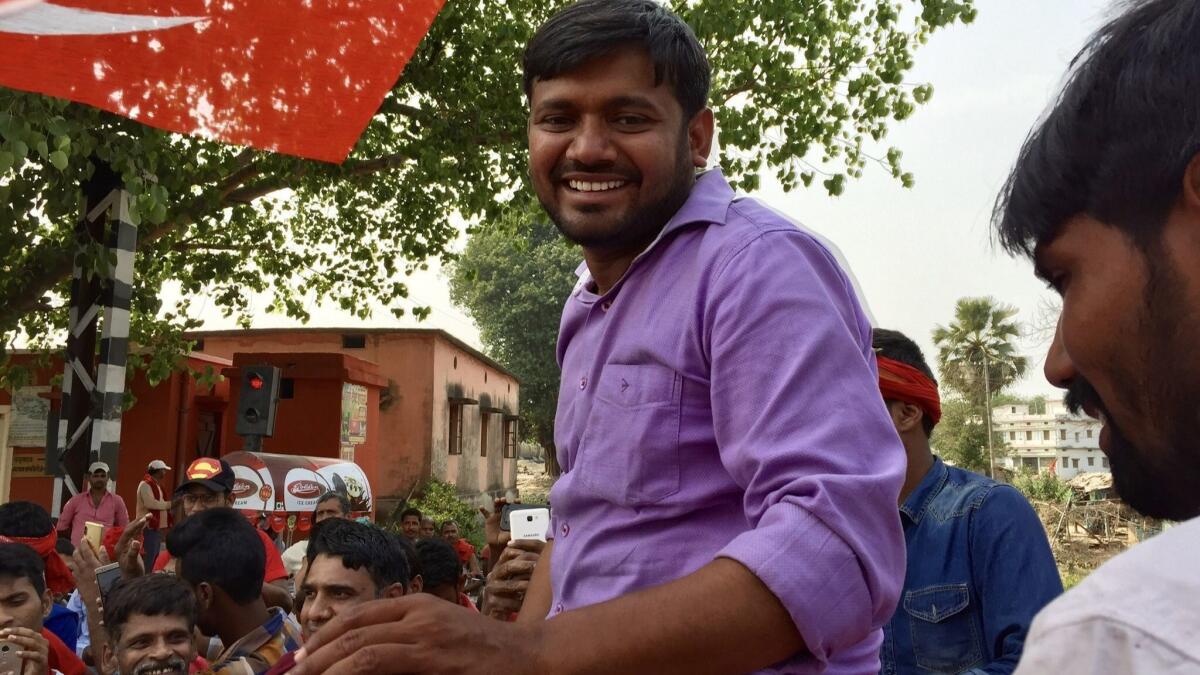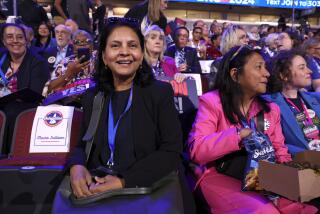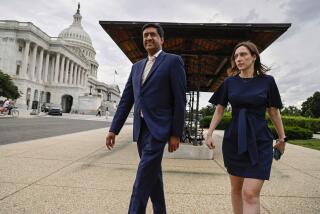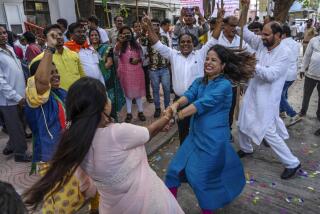Young politician emerges as a voice of opposition to India’s Narendra Modi

Reporting from Begusarai, India — The crowd at a campaign event for India’s oldest communist party shouted “Lal Salaam,” or “red salute,” while showering the candidate who arrived in their village with garlands.
After waiting several hours for this moment, Fatima and Nabisa Khatun, from the district of Begusarai in Bihar state, were thrilled.
For the record:
10:10 a.m. April 30, 2019An earlier version of this article said parliamentary candidate Kanhaiya Kumar was the Communist Party of India’s only candidate in Bihar state. The party has at least two candidates in the state.
“When we heard he was coming here, we were really excited,” Fatima said. Nabisa flashed a largely toothless grin.
The man they had come to see was Kanhaiya Kumar, who a few years ago was an unknown doctorate student in New Delhi. Now the 32-year-old is a household name across India as a candidate in one of the most visible campaigns in the nation’s parliamentary elections, a seven-phase process that began April 11 and runs through May 19, with results expected May 23.
He has emerged as a face of the diverse opposition to 68-year-old Prime Minister Narendra Modi, a staunch Hindu nationalist who is seeking a second term.
Opinion polls suggest that Modi’s Bharatiya Janata Party will once again win the most parliamentary seats and, through alliances with smaller parties, form a government with Modi remaining at the helm.
But those same polls suggest a much smaller victory for Modi compared with the absolute majority his party won when it took power in 2014. Although he remains popular, controversial economic policies, high unemployment and a rise in religious intolerance have made the prime minister vulnerable to criticism from those willing to take him on.
Kumar is one of those voices, and observers say he has gained momentum through his youth, humble beginnings, campus activism and oratorical skills.
He rose to prominence in 2016 when lawmakers from Modi’s Bharatiya Janata Party accused him of chanting “anti-national slogans” at the liberal university where he was student body president.
Kumar spent 23 days in jail before being released on bail. A sedition case against him, which he calls “politically motivated,” is yet to be resolved.
Within hours of his release from jail, he delivered a fiery speech telecast nationwide that criticized Modi for using the colonial-era sedition law as a tool to silence critics. His flair for oratory has carried over to the campaign trail, where in April alone he has addressed more than 100 public gatherings.
In an interview while campaigning in Begusarai, his home constituency, Kumar said he never harbored political ambitions before 2016, but now feels he has no other choice.
“After a point in time you have to take positions,” he said. “Only criticizing is not sufficient to fight certain types of ideological organizations.”
The organizations Kumar is referring to are Modi’s governing Bharatiya Janata Party and the umbrella group it belongs to, the Rashtriya Swayamsevak Sangh. Both are Hindu nationalist entities, and Kumar has strongly criticized them for promoting religious divisions, particularly between the Hindu majority and Muslim minority.
Although Kumar is running in a small, remote constituency, it seems at times that he’s taking on the BJP and RSS at a national level on such issues.
One of his opponents in the Begusarai race is Giriraj Singh, a BJP hard-liner, who has said that anyone opposed to Modi should move to Pakistan, India’s Muslim-majority neighbor and rival.
Muslims in Bihar have traditionally voted in large numbers for regional politicians; the third candidate in the race is a Muslim from the main regional party. But Kumar, who is Hindu, has won popularity among Muslims for his outspokenness on hate speech and communal atrocities such as mob lynchings of people suspected of slaughtering cows — which are revered in Hinduism — or eating beef.
“We stand with him because of what is happening in our country right now with the divisions between Hindus, Muslims, Sikhs and Christians,” said Mohammed Sunny, a 22-year-old Muslim student from Begusarai.
“This is all wrong and Kanhaiya is against this. I am Indian and he is Indian. Indians live together and don’t think about whether they’re Hindu or Muslim. When did [thinking about religious identity first] start? It started happening after the BJP took over in the last five years.”
Kumar is running under the banner of the Communist Party of India, the oldest of India’s once formidable roster of communist political organizations. The party has lost some of its luster in recent times, and Kumar is one of only two candidates it’s fielding in the state.
But his populist campaign in a district that has been dubbed the “Leningrad of Bihar” makes for an ideological fit.
“If we want to strengthen India, we have to strengthen the people of India…[by providing] good education, a good health system and facilities, good transportation system, peace in society and social security,” he said.
With Begusarai scheduled to vote Monday — the fourth of India’s seven phases of voting — Kumar crisscrossed the district this week, greeting crowds from the open sunroof of a car. The so-called roadshows are a feature of Indian politics, but they can get repetitive and tiring — lasting as long as 12 hours — and emphasize hitting as many villages as possible rather than Kumar’s speaking panache.
In an interview during a short lunch break, his energy looked low. But his campaigning apparently has paid off, helping him raise around $100,000 — the maximum amount permitted under electoral rules — in one week through online crowdfunding, a rare phenomenon in India, where the origins of campaign cash are notoriously opaque.
Kumar’s supporters said his popularity lies in his common touch, especially among young voters and those struggling economically in a relatively poor district. Many have traveled to Begusarai from across the country to participate in what they see as the beginning of something bigger.
But he has also generated suspicions in a state where voters have typically voted along the lines of caste, India’s social hierarchy that dates back centuries. Although from a poor family, Kumar belongs to Bhumihars, an upper-caste grouping whose members have committed violence against lower castes in the past.
Vishnu Narayan, who runs a Hindi-language news site called the Bihar Mail, said some Hindus are wary of Kumar’s caste. And some Bhumihars have questioned why Kumar spends so much time engaging with Muslims rather than with them. A recent roadshow of his was blocked by protesters, leading to a brief scuffle.
Still, Kumar was confident that his campaign was pushing people to break traditional voting patterns.
“I am not invoking caste and religion,” he said. “I am talking about issues, I am talking about the constitution, I am talking about democracy, I am talking about the betterment of people’s lives and how government should tackle the basic needs of common people.”
Malhotra is a special correspondent.
More to Read
Sign up for Essential California
The most important California stories and recommendations in your inbox every morning.
You may occasionally receive promotional content from the Los Angeles Times.










